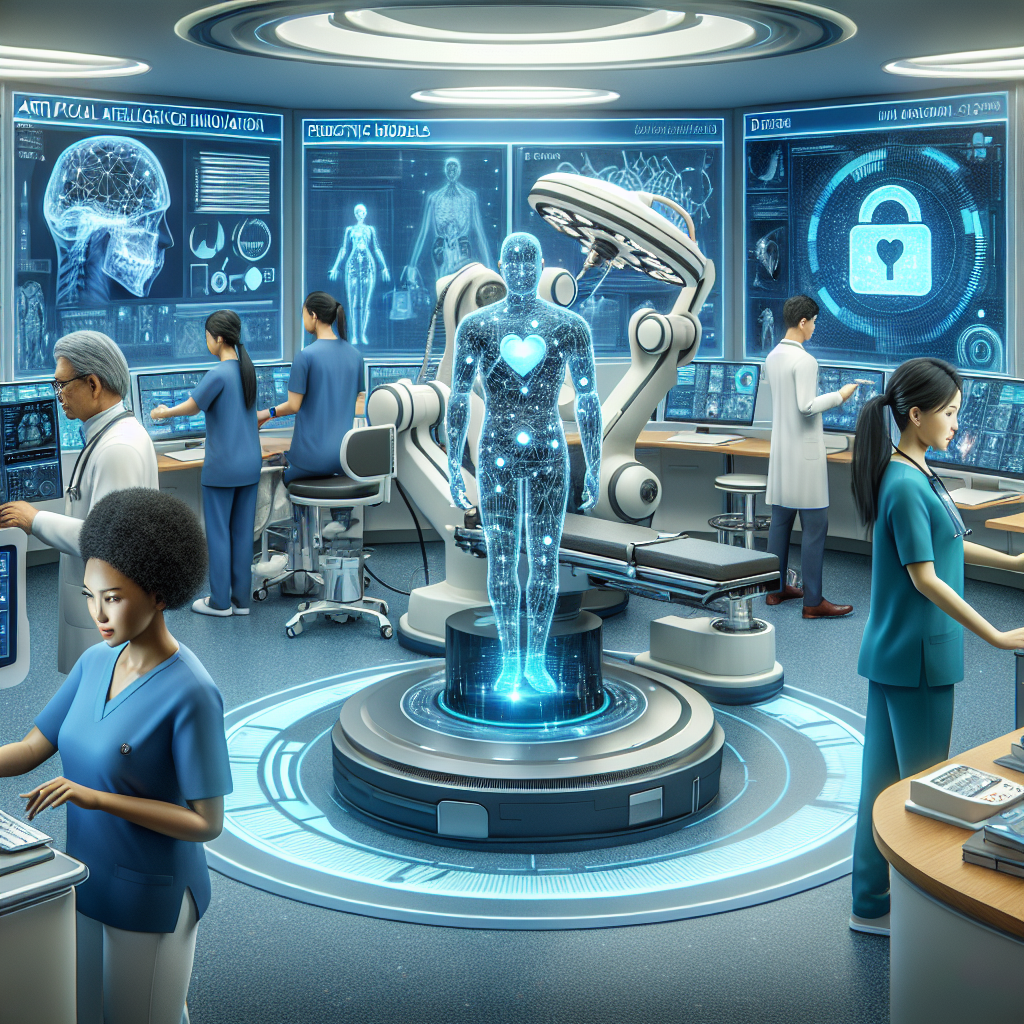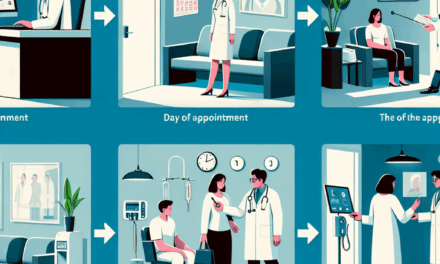Shaping the Future of Healthcare with AI Innovation

The integration of Artificial Intelligence (AI) into healthcare is revolutionizing the industry, offering unprecedented opportunities to enhance patient care, streamline operations, and reduce costs. As AI technologies continue to evolve, they are poised to address some of the most pressing challenges in healthcare, from improving diagnostic accuracy to personalizing treatment plans. This article explores how AI is shaping the future of healthcare through five key subtopics, each providing detailed insights into the transformative potential of AI in this critical sector.
1. AI in Diagnostics: Enhancing Accuracy and Speed
One of the most promising applications of AI in healthcare is in the field of diagnostics. AI algorithms, particularly those based on machine learning and deep learning, have demonstrated remarkable capabilities in analyzing medical images and identifying patterns that may be indicative of diseases. This section delves into how AI is enhancing diagnostic accuracy and speed, ultimately leading to better patient outcomes.
1.1 Revolutionizing Medical Imaging
Medical imaging is a cornerstone of modern diagnostics, and AI is playing a pivotal role in transforming this domain. AI algorithms can analyze vast amounts of imaging data, such as X-rays, MRIs, and CT scans, with a level of precision that often surpasses human capabilities. For instance, AI systems have been developed to detect early signs of cancer, such as breast cancer and lung cancer, with high accuracy.
One notable example is Google’s DeepMind, which has developed an AI model capable of diagnosing eye diseases from retinal scans with an accuracy comparable to that of expert ophthalmologists. This technology not only speeds up the diagnostic process but also reduces the likelihood of human error, ensuring that patients receive timely and accurate diagnoses.
1.2 AI-Powered Pathology
Pathology, the study of disease through the examination of tissues and cells, is another area where AI is making significant strides. Traditional pathology relies heavily on the expertise of pathologists to interpret complex tissue samples. However, AI-powered pathology systems can assist pathologists by rapidly analyzing digital slides and identifying abnormalities.
For example, PathAI, a leading company in this field, has developed AI algorithms that can accurately grade cancerous tissues, providing pathologists with valuable insights that aid in diagnosis and treatment planning. This not only enhances the efficiency of pathology labs but also ensures that patients receive precise and personalized care.
1.3 Reducing Diagnostic Errors
Diagnostic errors are a significant concern in healthcare, often leading to delayed or incorrect treatment. AI has the potential to mitigate these errors by providing clinicians with decision support tools that offer evidence-based recommendations. These tools analyze patient data, including medical history and test results, to suggest potential diagnoses and treatment options.
IBM Watson Health, for instance, has developed AI systems that assist oncologists in identifying the most effective cancer treatments based on a patient’s unique genetic profile. By leveraging AI, healthcare providers can reduce diagnostic errors and improve patient outcomes, ultimately enhancing the quality of care.
1.4 Case Study: AI in Radiology
A compelling case study highlighting the impact of AI in diagnostics is its application in radiology. Radiologists are often overwhelmed with the volume of imaging studies they must review, leading to fatigue and potential errors. AI-powered radiology tools can prioritize cases based on urgency, flagging critical findings for immediate attention.
For example, Aidoc, an AI company specializing in radiology, has developed algorithms that can detect acute conditions such as intracranial hemorrhages and pulmonary embolisms in real-time. This technology not only improves the efficiency of radiology departments but also ensures that patients with life-threatening conditions receive prompt care.
1.5 The Future of AI in Diagnostics
The future of AI in diagnostics holds immense promise. As AI algorithms continue to improve, they will become increasingly adept at handling complex diagnostic tasks, such as predicting disease progression and identifying rare conditions. Moreover, the integration of AI with other technologies, such as genomics and wearable devices, will enable a more comprehensive understanding of patient health.
In conclusion, AI is revolutionizing diagnostics by enhancing accuracy, reducing errors, and improving patient outcomes. As these technologies continue to evolve, they will play an increasingly vital role in shaping the future of healthcare.
2. AI in Personalized Medicine: Tailoring Treatment to Individuals
Personalized medicine, also known as precision medicine, is an approach that tailors medical treatment to the individual characteristics of each patient. AI is at the forefront of this movement, enabling healthcare providers to develop personalized treatment plans based on a patient’s genetic makeup, lifestyle, and environmental factors. This section explores how AI is driving the shift towards personalized medicine and its implications for patient care.
2.1 Genomic Analysis and AI
Genomic analysis is a critical component of personalized medicine, as it provides insights into a patient’s genetic predispositions and potential responses to treatment. AI algorithms are instrumental in analyzing vast amounts of genomic data, identifying genetic variants associated with diseases, and predicting how patients will respond to specific therapies.
For instance, AI-driven platforms like Tempus use machine learning to analyze genomic data and provide oncologists with actionable insights for cancer treatment. By understanding the genetic mutations driving a patient’s cancer, clinicians can select targeted therapies that are more likely to be effective, minimizing trial-and-error approaches and improving patient outcomes.
2.2 AI in Drug Discovery
AI is also transforming the drug discovery process, which is traditionally time-consuming and costly. By leveraging AI, pharmaceutical companies can accelerate the identification of potential drug candidates and optimize clinical trial designs. AI algorithms can analyze vast datasets to identify promising compounds and predict their efficacy and safety profiles.
One notable example is Insilico Medicine, a company that uses AI to discover new drug candidates for various diseases. Their AI platform has successfully identified potential treatments for conditions such as fibrosis and cancer, significantly reducing the time and cost associated with traditional drug discovery methods.
2.3 Personalized Treatment Plans
AI is enabling the development of personalized treatment plans that consider a patient’s unique characteristics, such as genetic makeup, medical history, and lifestyle factors. By analyzing this data, AI algorithms can recommend tailored treatment options that maximize efficacy and minimize adverse effects.
For example, IBM Watson for Oncology uses AI to analyze patient data and provide oncologists with evidence-based treatment recommendations. This approach ensures that patients receive treatments that are most likely to be effective for their specific condition, improving outcomes and reducing unnecessary interventions.
2.4 Case Study: AI in Cardiovascular Disease Management
A compelling case study illustrating the impact of AI in personalized medicine is its application in cardiovascular disease management. Cardiovascular diseases are a leading cause of mortality worldwide, and personalized treatment approaches are essential for improving patient outcomes.
AI-powered platforms like HeartFlow use advanced algorithms to create personalized 3D models of a patient’s coronary arteries based on CT scans. These models help cardiologists assess the severity of blockages and determine the most appropriate treatment, such as medication or surgical intervention. By tailoring treatment to the individual patient, AI is improving the management of cardiovascular diseases and reducing the risk of adverse events.
2.5 The Future of Personalized Medicine with AI
The future of personalized medicine with AI is promising, as advancements in AI technologies continue to enhance our understanding of individual patient needs. As AI algorithms become more sophisticated, they will enable even more precise predictions of disease risk and treatment responses, leading to truly personalized healthcare.
In conclusion, AI is driving the shift towards personalized medicine by enabling healthcare providers to tailor treatment plans to individual patients. This approach not only improves patient outcomes but also reduces healthcare costs by minimizing ineffective treatments and adverse events.
3. AI in Healthcare Operations: Streamlining Efficiency
Beyond clinical applications, AI is also transforming healthcare operations by streamlining administrative processes, optimizing resource allocation, and enhancing patient engagement. This section explores how AI is improving the efficiency of healthcare operations and its impact on the overall healthcare system.
3.1 Automating Administrative Tasks
Administrative tasks, such as scheduling appointments, managing patient records, and processing insurance claims, are essential but time-consuming aspects of healthcare operations. AI-powered solutions are automating these tasks, freeing up valuable time for healthcare professionals to focus on patient care.
For example, AI chatbots and virtual assistants are being used to handle routine inquiries, schedule appointments, and provide patients with information about their conditions and treatments. This not only improves the efficiency of healthcare facilities but also enhances the patient experience by providing timely and accurate information.
3.2 Optimizing Resource Allocation
Efficient resource allocation is critical for healthcare facilities to provide high-quality care while minimizing costs. AI algorithms can analyze data on patient flow, staff availability, and equipment usage to optimize resource allocation and reduce waste.
For instance, AI-powered predictive analytics tools can forecast patient demand and adjust staffing levels accordingly, ensuring that healthcare facilities are adequately staffed to meet patient needs. This approach not only improves operational efficiency but also enhances patient satisfaction by reducing wait times and improving access to care.
3.3 Enhancing Patient Engagement
Patient engagement is a key factor in improving health outcomes and reducing healthcare costs. AI technologies are enhancing patient engagement by providing personalized health information, reminders for medication adherence, and tools for self-management of chronic conditions.
For example, AI-powered mobile apps can provide patients with personalized health recommendations based on their medical history and lifestyle factors. These apps can also send reminders for medication adherence and track patient progress, empowering patients to take an active role in managing their health.
3.4 Case Study: AI in Hospital Management
A compelling case study illustrating the impact of AI in healthcare operations is its application in hospital management. Hospitals are complex organizations that require efficient management of resources to provide high-quality care.
AI-powered platforms like Qventus use machine learning algorithms to optimize hospital operations by predicting patient admissions, discharges, and transfers. This enables hospitals to allocate resources more effectively, reduce wait times, and improve patient flow. By streamlining hospital operations, AI is enhancing the efficiency and quality of care provided to patients.
3.5 The Future of AI in Healthcare Operations
The future of AI in healthcare operations is promising, as advancements in AI technologies continue to enhance the efficiency and effectiveness of healthcare systems. As AI algorithms become more sophisticated, they will enable even more precise predictions and optimizations, leading to more efficient healthcare operations.
In conclusion, AI is transforming healthcare operations by automating administrative tasks, optimizing resource allocation, and enhancing patient engagement. These advancements are improving the efficiency and quality of care provided to patients, ultimately enhancing the overall healthcare system.
4. AI in Predictive Analytics: Anticipating Health Trends
Predictive analytics is a powerful tool that leverages data to anticipate future health trends and inform decision-making. AI is at the forefront of this movement, enabling healthcare providers to predict disease outbreaks, identify at-risk populations, and optimize treatment plans. This section explores how AI is driving the shift towards predictive analytics and its implications for healthcare.
4.1 Predicting Disease Outbreaks
AI-powered predictive analytics tools are being used to predict disease outbreaks by analyzing data from various sources, such as social media, weather patterns, and healthcare records. These tools can identify patterns and trends that may indicate an impending outbreak, enabling healthcare providers to take proactive measures to prevent the spread of disease.
For example, BlueDot, a Canadian company, uses AI algorithms to analyze data from various sources to predict the spread of infectious diseases. Their platform successfully predicted the outbreak of COVID-19 in Wuhan, China, days before it was officially reported by health authorities. By providing early warnings of disease outbreaks, AI is enabling healthcare providers to respond more effectively and prevent the spread of disease.
4.2 Identifying At-Risk Populations
AI-powered predictive analytics tools are also being used to identify at-risk populations by analyzing data on social determinants of health, such as income, education, and access to healthcare. These tools can identify individuals who are at higher risk of developing certain conditions, enabling healthcare providers to target interventions and resources more effectively.
For instance, Health Catalyst, a healthcare data analytics company, uses AI algorithms to identify patients at risk of readmission by analyzing data on social determinants of health. By identifying at-risk patients, healthcare providers can implement targeted interventions to prevent readmissions and improve patient outcomes.
4.3 Optimizing Treatment Plans
AI-powered predictive analytics tools are also being used to optimize treatment plans by analyzing data on patient outcomes and treatment efficacy. These tools can identify patterns and trends that may indicate the most effective treatment options for individual patients, enabling healthcare providers to tailor treatment plans to individual needs.
For example, Flatiron Health, a healthcare technology company, uses AI algorithms to analyze data on cancer treatment outcomes to identify the most effective treatment options for individual patients. By optimizing treatment plans, AI is improving patient outcomes and reducing healthcare costs by minimizing ineffective treatments.
4.4 Case Study: AI in Chronic Disease Management
A compelling case study illustrating the impact of AI in predictive analytics is its application in chronic disease management. Chronic diseases, such as diabetes and heart disease, are a leading cause of mortality worldwide, and predictive analytics tools are essential for improving patient outcomes.
AI-powered platforms like Livongo use predictive analytics to provide personalized health recommendations for patients with chronic conditions. These platforms analyze data on patient behavior and health outcomes to identify patterns and trends that may indicate the need for intervention. By providing personalized health recommendations, AI is empowering patients to take an active role in managing their health and improving outcomes.
4.5 The Future of Predictive Analytics with AI
The future of predictive analytics with AI is promising, as advancements in AI technologies continue to enhance our ability to anticipate health trends and inform decision-making. As AI algorithms become more sophisticated, they will enable even more precise predictions and optimizations, leading to more effective healthcare interventions.
In conclusion, AI is driving the shift towards predictive analytics by enabling healthcare providers to anticipate health trends and inform decision-making. These advancements are improving patient outcomes and reducing healthcare costs by enabling more effective interventions and resource allocation.
5. Ethical Considerations and Challenges in AI-Driven Healthcare
While AI holds immense potential for transforming healthcare, it also raises important ethical considerations and challenges that must be addressed. This section explores the ethical implications of AI in healthcare and the challenges that must be overcome to ensure its responsible and equitable use.
5.1 Data Privacy and Security
Data privacy and security are critical concerns in AI-driven healthcare, as AI algorithms rely on vast amounts of data to make predictions and recommendations. Ensuring the privacy and security of patient data is essential to maintaining trust in AI technologies and protecting patient rights.
Healthcare providers must implement robust data protection measures, such as encryption and access controls, to safeguard patient data from unauthorized access and breaches. Additionally, clear policies and regulations must be established to govern the collection, use, and sharing of patient data in AI-driven healthcare.
5.2 Bias and Fairness
Bias and fairness are also important considerations in AI-driven healthcare, as AI algorithms can perpetuate existing biases in healthcare data and decision-making. Ensuring that AI technologies are fair and unbiased is essential to promoting equitable access to care and improving patient outcomes.
Healthcare providers must implement measures to identify and mitigate bias in AI algorithms, such as diverse training datasets and regular audits of algorithm performance. Additionally, transparency and accountability must be prioritized to ensure that AI technologies are used responsibly and ethically.
5.3 Informed Consent and Autonomy
Informed consent and autonomy are critical ethical considerations in AI-driven healthcare, as patients must be fully informed about the use of AI technologies in their care and have the autonomy to make decisions about their treatment.
Healthcare providers must ensure that patients are fully informed about the use of AI technologies in their care and have the opportunity to provide informed consent. Additionally, patients must have the autonomy to make decisions about their treatment, including the option to opt-out of AI-driven interventions if desired.
5.4 Accountability and Liability
Accountability and liability are also important considerations in AI-driven healthcare, as the use of AI technologies raises questions about who is responsible for errors or adverse outcomes.
Healthcare providers must establish clear policies and regulations to govern the use of AI technologies and ensure accountability for errors or adverse outcomes. Additionally, liability frameworks must be established to address potential legal and ethical issues arising from the use of AI technologies in healthcare.
5.5 The Future of Ethical AI in Healthcare
The future of ethical AI in healthcare is promising, as advancements in AI technologies continue to enhance our ability to address ethical considerations and challenges. As AI algorithms become more sophisticated, they will enable even more precise predictions and optimizations, leading to more effective healthcare interventions.
In conclusion, while AI holds immense potential for transforming healthcare, it also raises important ethical considerations and challenges that must be addressed. By prioritizing data privacy and security, bias and fairness, informed consent and autonomy, and accountability and liability, healthcare providers can ensure the responsible and equitable use of AI technologies in healthcare.
Conclusion
AI innovation is undeniably shaping the future of healthcare by enhancing diagnostics, personalizing medicine, streamlining operations, and enabling predictive analytics. These advancements are improving patient outcomes, reducing healthcare costs, and enhancing the overall efficiency of healthcare systems. However, the integration of AI into healthcare also raises important ethical considerations and challenges that must be addressed to ensure its responsible and equitable use.
As AI technologies continue to evolve, they hold immense potential for transforming healthcare and addressing some of the most pressing challenges in the industry. By prioritizing ethical considerations and leveraging the transformative potential of AI, healthcare providers can ensure that these technologies are used to improve patient care and enhance the overall healthcare system.





